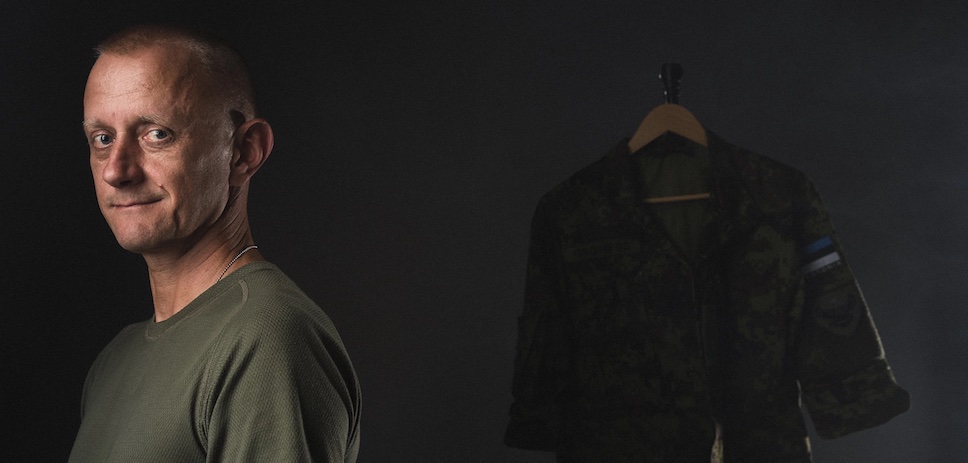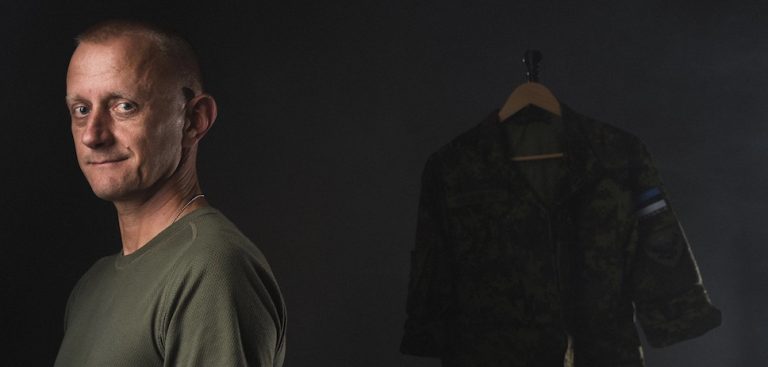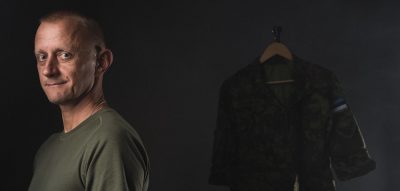Photo: Kiur Kaasik (Delfi Estonia) 2023-09-15
Photo: Kiur Kaasik (Delfi Estonia) 2023-09-15
If the war were to stop today, it would take Russia between three to five years to restore its military might and capabilities to the level they would need to strike the next neighboring country, says colonel Margo Grosberg, outgoing chief of Estonia’s military intelligence in a rare interview, published in English on VSquare.
February 24, 2022. It had been maybe 10 hours since Vladimir Putin announced the “special military operation” against Ukraine, but the fighting was already taking place dangerously close to Kyiv. Russian forces were trying to take control of the Hostomel airport on the north-western outskirts of Ukraine’s capital. Columns of tanks and other heavy equipment were heading towards Kyiv from Belarus. It was only a 130 kilometers journey.
This interview’s Estonian version was published on Delfi.ee.
Then, roughly 800 km away in Pskov, 18 IL-76 transport planes started their engines and headed towards the takeoff track. The planes were full of perhaps Russia’s most elite airborne troops from the 76th Guards Air Assault Division. The approximately 1,000 troops loaded onto the planes were highly trained, and many of them already experienced from the Chechen wars. Their objective was to fly to Kyiv and quickly finish the “special military operation.”
The ILs were already halfway towards the Hostomel airport when Christo Grozev was the first to publicly draw attention to it: “The only plausible goal would be to capture and subordinate Kyiv (and install a puppet government) today. While the world is watching and doing almost nothing.”
But luckily this time Grozev got it a little bit wrong. Two different sources confirmed to Delfi Estonia that Estonia’s military intelligence, officially known in English as the Military Intelligence Centre of Estonian Defense Forces, had sent an advance warning to their Ukrainian colleagues before the troops had even stepped on the planes.
“I cannot confirm or deny this,” says Estonian military intelligence chief colonel Margo Grosberg when asked about it. His pause before the answer seems just a tad too long. But he acknowledges that the Hostomel battle that day might well have been the most crucial battle in the whole course of the Ukrainian war so far.
“If the ILs would have been able to land at Hostomel, we might be today in a totally different situation than what he have,” he says.
Ukraine poured everything it had around Kyiv to keep the planes from landing. The Ukrainians showered the airfield with artillery fire to make the landing strip unusable. Apparently one of Russia’s KA-52 attack helicopters was shot down and crashed on the runway making it virtually impossible for the ILs to land. After circling in the Ukrainian sky for some time, they needed to return to the base.
Grosberg turned 50 on September 12. His retirement is two days later, on September 14. He is stepping down from the Estonian Defence Forces. He agreed to sit down with Delfi Estonia’s journalists for an exclusive interview. Although his weekly public video updates about the situation on the ground have become routine and rendered him arguably the most known intelligence officer in the country, it is only his third ever sit-down interview.
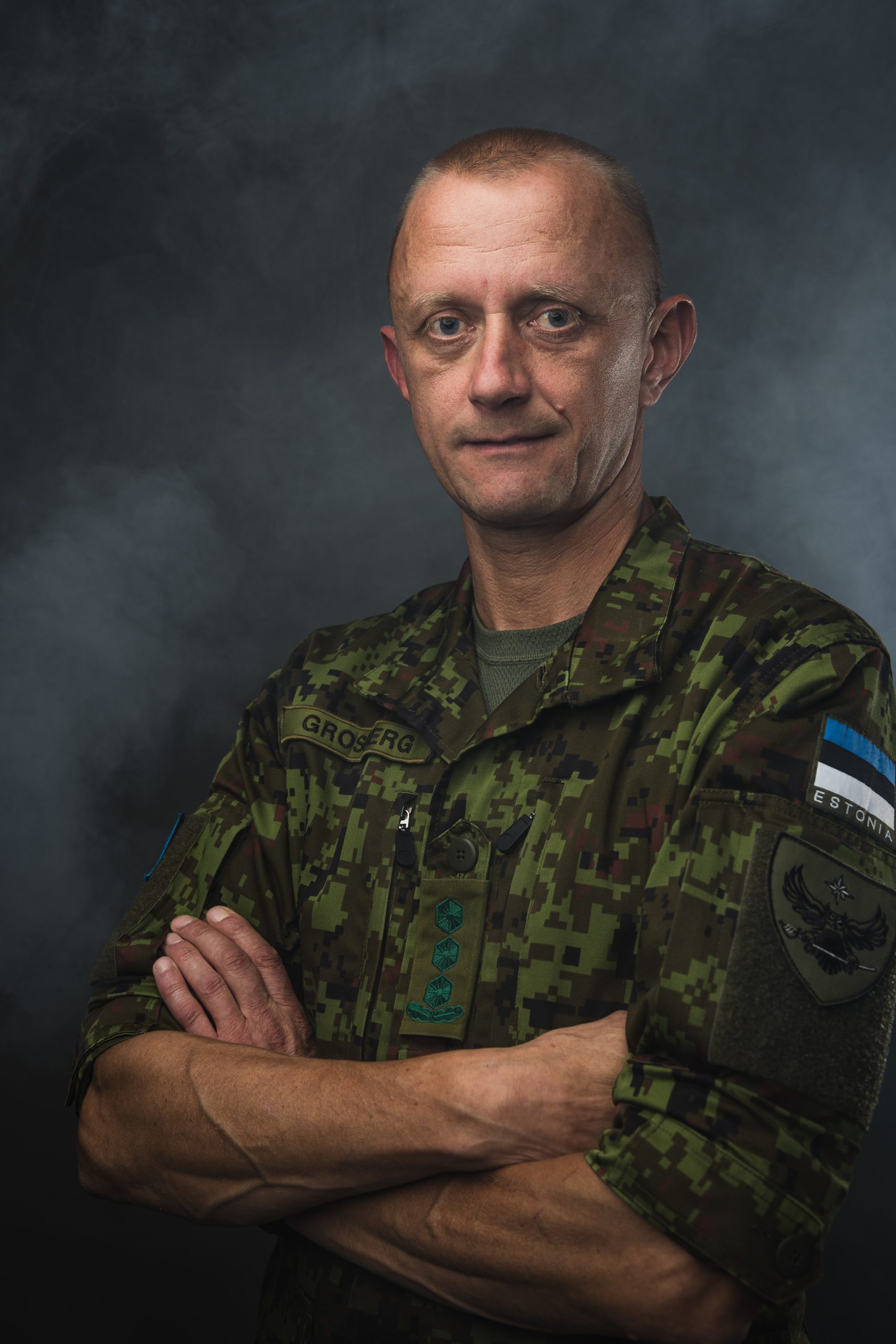
Photo: Kiur Kaasik / Delfi Estonia
Russia’s failure in building up its military presence before the war is one the reasons that the war has gone on for more than a year and a half already, Grosberg says. “The foundations of how Russia planned for the war were clearly wrong. It is the classic phenomena of dictatorships: the dictator is only served the information that people expect him to want to hear. He is not served the truth.” Grosberg says this is still evident today as indicated by the firing of the chief of Russia’s 58th army, General Ivan Popov.
The Estonian military intelligence started picking up alarming signals back in the spring of 2021. Some of Russia’s military units were strangely relocated, moving close to Ukraine’s borders. According to Grosberg, such movements were small in numbers, but were nevertheless not normal. Then, in September 2021, Russia held its Zapad military drill in Western Russia and Belarus. This was not out of the ordinary. But after the large-scale exercise, units from 41. The Combined Arms Army of the Central military district didn’t return home.
One of the Estonian military intelligence’s largest successes was picking up early that Russia was going to annex Crimea in 2014.
“We saw it ahead long enough to make the alarm bells ring both in Estonia and NATO,” Grosberg says. They rang the alarm. But practically no one listened. “When we take a look at what was the international reaction to the [annexation] of Crimea, it is clear that we weren’t listened to. Crimea led to Donbass. The result of Donbass is today’s Ukraine.”
Although his agency picked up early signals ahead of the current war, this time they fell short of predicting the start of the war. “When you looked at the composition and concentration of Russia’s forces [along the Ukrainian borders], the answer was that they wouldn’t be able to do it. As it became clear, they really can make very stupid decisions and conduct the operation with only a third of required forces,” Grosberg says.
He says that, as time progressed, Russia’s demands to change the security architecture of Ukraine, NATO, and the European Union became increasingly vocal, and it became evident that there would be war. “The question was when the attack would begin.”
He does not belong to the school that thinks Russia has not been able to learn during the 19 months of fighting and continues to make the same mistakes. “They are definitely not stupid. Neither unable to learn.”
Still, according to Grosberg, it took Russia at least until the beginning of this year to cope with the mistakes that originated from the totally failed initial war plan. He asks when you last heard of HIMARSes and goes on to immediately answer himself: it was the New Year’s Eve at Mariinka when Ukraine hit a large gathering of mobilized troops.
“This indicates that Russia was able to learn and they adapted their logistics chains to stay out of reach of HIMARS. The same goes for their decisions to pull out of northern Ukraine and Kherson. They understood that if they’d stayed, their situation could get really embarrassing.”
When the war started, Grosberg gave two commands to his subordinates. First, they were not to count the dead or wounded because doing so would take up too many resources. Second, they were not to gather intelligence about Ukraine (this was to keep the Ukrainian operational security at the highest possible level).
He admits that these decisions complicated their main task of better understanding how Russian units are fighting, which is further complicated by the “fog of war.” Do they follow their tactical and doctrinal plans or are there discrepancies? If there are, then why? Is it because of lack of personnel, or for some other reason? All this knowledge is intended to help the Estonian Defence Forces be better prepared and equipped.
He himself has visited Kyiv only once during the war. It was shortly after Russia retreated from near Kyiv last April. He explains that he doesn’t want to be a bother to people who are actively at war to defend their country.
Still, it is clear that Grosberg has close connections with his Ukrainian counterpart Kyrylo Budanov, and the same goes for the two countries’ military intelligence more broadly. There aren’t many Western intelligence agencies that shared an in-depth interest in Russia and an understanding of the “Russian way” before the war. Besides the Baltic military intelligence services, it was perhaps only Finland and Poland. And of course Ukraine.
Back in the 1980s, as a teenager, he joined the maritime school in Tallinn. This was still in the time of the Soviet Union, and all but two subjects were taught in Russian. Almost all of his classmates spoke only Russian. Grosberg aimed to become a long-distance seaman because. At the time, it seemed like the only possible way to experience life outside of the Soviet Union. In the end, he didn’t graduate because Russian-language mathematics proved an “insurmountable obstacle,” but he left the school with perfect language skills—and, he says, with perfect understanding of Russians.
On one of Grosberg’s visits to Kyiv before the war, Budanov gifted him an old Dnepr sidecar motorcycle (Grosberg is an avid collector of old motorbikes). Anti-corruption regulation prevented Grosberg from accepting the gift.
Now, during the war, Grosberg asked for a different type of present from Ukraine. Instead of an old motorcycle, he asked for a Russian unmanned aerial vehicle that Ukraine had captured. The Ukrainians packed one of a specific type of UAVs that was in surprisingly good condition. Back home, the Estonian military intelligence was able to study the UAV and Grosberg says the local defense forces are now better aware of how to defend against it. Then they sent the model back to Ukraine.
***
Grosberg estimates that Russia has enough resources to continue waging the war against Ukraine “at least as long as it has already been ongoing.” But it depends. “Depends if the sanctions will hold and how well we can implement them. It largely depends how well we as the collective west can endure and how well we recognize that it is not just a piece of land for what Ukraine is fighting but it is the same values that we respect and protect. As long as we understand this, the situation is satisfactory – far from good but satisfactory,” he says.
Besides Russia’s totally failed initial planning, the second reason that the war has carried out for so long lies in the same “collective west” and its slow political decision making process, according to Grosberg. “Now, 550-plus days into the war, we have agreed to supply Ukraine with weapons and equipment that Zelensky asked on day one. If it would have been granted right then and not delivering heavy equipment by a few pieces at a time only, the situation could be much different.”
Grosberg says that new weapons systems, such as the F16 fighter jets and ATACMs, will bring Ukraine “one more step closer to victory,” but that they will not be a “silver bullet” that will decide the war. “Russia is not sitting idly and waiting for the F16s to arrive in the war. They are taking measures to adapt against them and they have nine months to do it.”
He makes clear that he doesn’t think much of the supposed “red lines” that might push Putin to opt for tactical nuclear weapons. Surely, he says, the new weapons won’t cross that red line, if indeed such a line exists.
“As the west didn’t have any red lines in the Syrian war, also Putin doesn’t have any specific red lines in Ukraine. I don’t see the threat of tactical nuclear weapons as significantly high,” he says, and explains that Russia wouldn’t maintain any plausible deniability if they opted to use one.
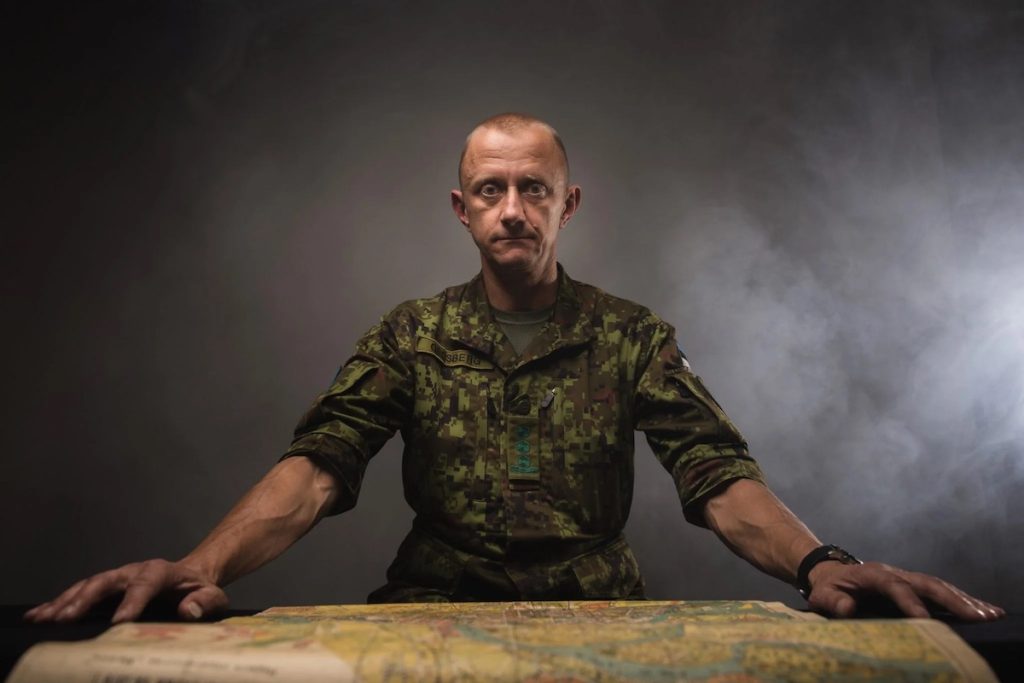
Photo: Kiur Kaasik / Delfi Estonia
An equally important question is how long it will take Russia to restore its military capabilities after the war. Grosberg reframes the question: how long will it take Russia to be ready to attack their next neighbor?
He says Russia still has roughly 6,000 tanks and between 8,000-9,000 armored vehicles at their mobilization storages. If they need to “cannibalize” two vehicles in order to get one that actually works, it would still make 2,000 tanks and 3,000 armored vehicles.
“Putin has declared that Russia’s aim is to modernize up to 500 tanks a year. According to this calculation they’d be ready [to attack a neighbor again] in four years.”
A lot depends on when and how the war ends. “Let’s take a scenario where the war ends today, sanctions will be upheld and Russia’s economy stagnates. [Defence minister Sergey] Shoigu’s plan is to increase Russia’s army to 1,5 million. When the economy is down and jobs scarce, it will be easy to recruit to the army. The cycle of training a petty officer is four years. Senior officers will come from the troops with battle experience. It is down to mathematics,” he explains.
At the same time, Grosberg is wary of assessing the progress of Ukraine’s counteroffensive, noting that the Russian defense could collapse tonight, but, alternatively, may not collapse at all before the winter. “The hope or expectation for Ukraine to reach the Azov sea… I wouldn’t dare to say it will happen before the winter.”
He says that the balance of forces is largely equal and that the fight is now not over territory, but about which side can force their will on the other. And on constantly keeping pressure that can eventually cause the other side to break.
“The reason why the Russian lines broke a year ago in Kharkiv was that troops from one Russian unit witnessed how another unit was retreating. They didn’t know but the decision for the first unit to retreat was tactical and justified. It wasn’t panic. But it caused panic among the lines of the unit seeing it and that led onto the total collapse. It was all about holding constant pressure on Russian forces. Simple as that.”
If Ukraine does not achieve a breakthrough before the winter, a lot will start depending on the weather conditions. Grosberg assesses that if winter brings lots of snow, also short spells of really cold that don’t allow the ground to freeze, then winter will see artillery battles like a year ago. But if it is a harsh winter, there can be larger maneuvers as well.
“It is very probable that Russia will take the time to dig in even more, to build new fortifications and prepare for the spring,” he says.
***
When General Martin Herem assumed office as the Commander of the Estonian Defense Forces in December 2018, Grosberg had held the military intelligence chief post for just a few months. At the first meeting in their new posts, Herem said something that made Grosberg’s stomach turn.
“Failure is written into your job description,” were the general’s words. He explained it as follows: Imagine that intelligence raises the alarm that a war is about to start. The defense forces will adapt to wartime formation, start to mobilize, and pull out thousands of men from their everyday life and the country’s economy. Such a situation could be maintained for several months, only for the country to not be attacked.
“We will never know why the war didn’t start: was it because they never intended to attack or was it because we were prepared and scared them off? But it will be close to impossible for the commander of the defense forces to ask the government to repeat the process for a second time. That’s a failure,” Herem explained.
“But if I won’t do it and will not ask the government to announce mobilization, it would also be a failure,” he added.
Grosberg turns 50 this week. He has served the last five years as head of Estonia’s Defense Forces Intelligence Center, 19 years in military intelligence and 30 years in the defense forces. He didn’t need to ask his commander to call for mobilization. That’s probably why he says that his “house” really didn’t fail during his reign.
“The best [accomplishment] is that our most potential adversary has not been able to develop ahead of us, that we wouldn’t know what they’re doing, or that they could significantly surprise us,” he says just ahead of retiring.
“It really is a constant struggle.”
Head of the investigative desk at Delfi Estonia, Holger Roonemaa has extensively investigated topics related to national security, including Russia’s espionage, interference, and influence operations in Estonia and the wider region. He is a member of the International Consortium on Investigative Journalists (ICIJ). Estonia’s national media association named him the journalist of the year in 2020 and 2021.

